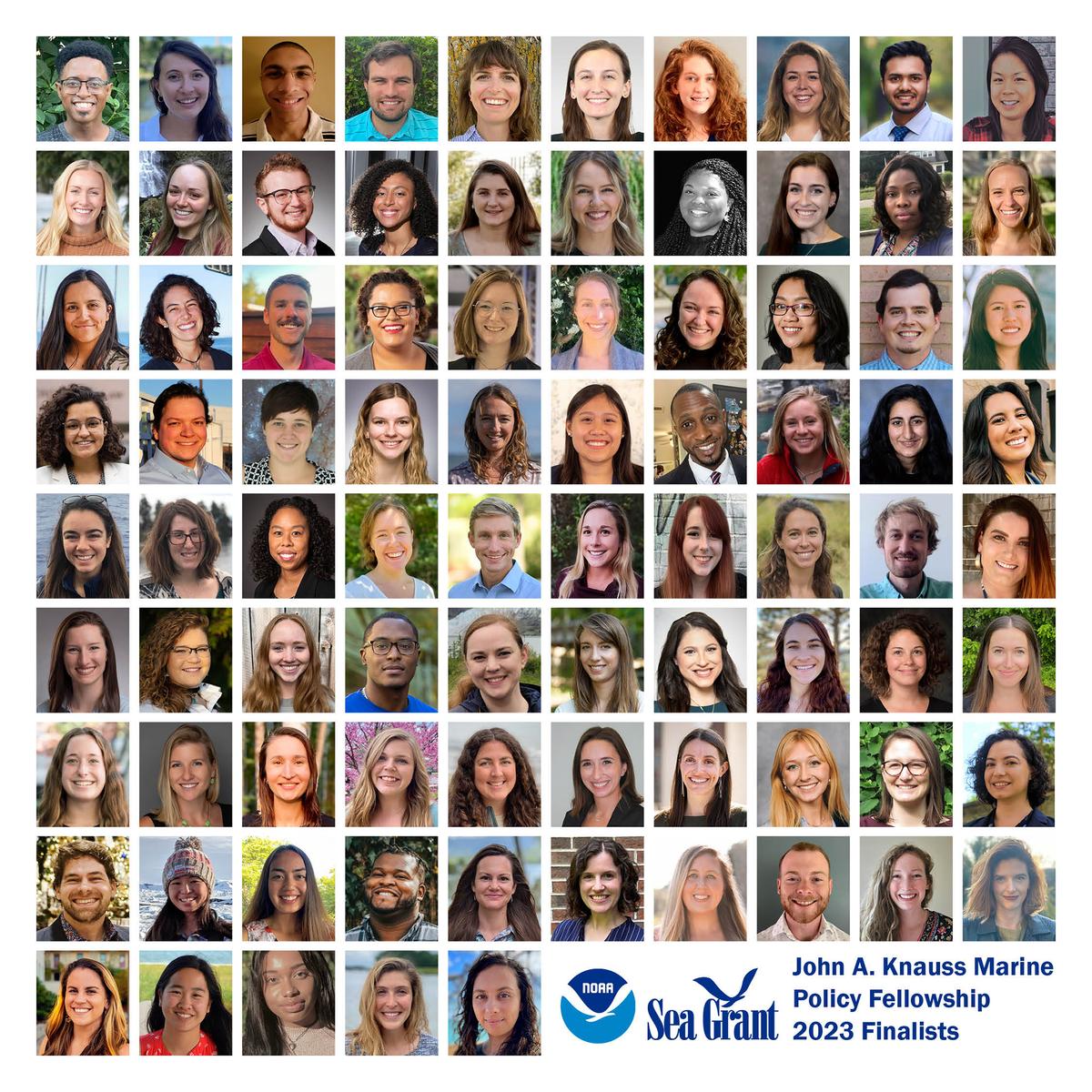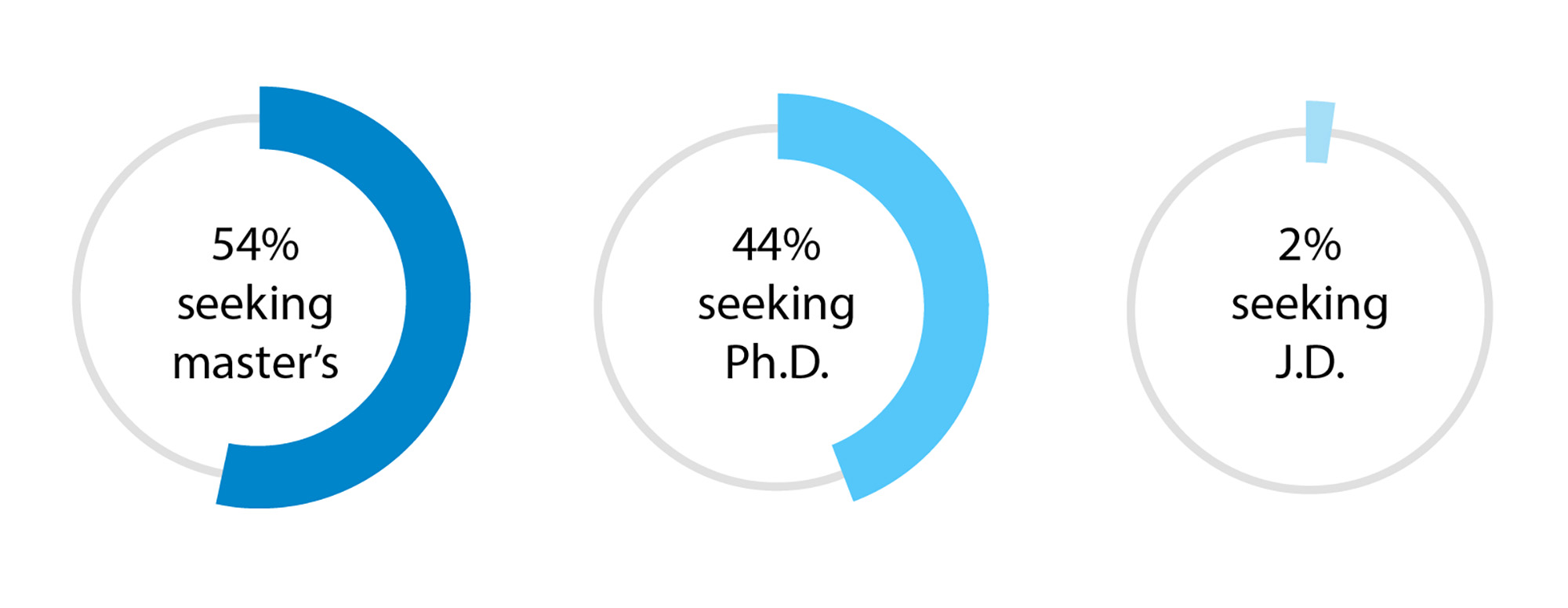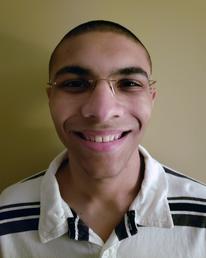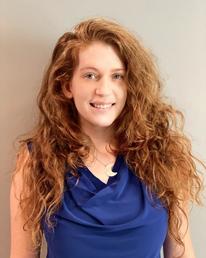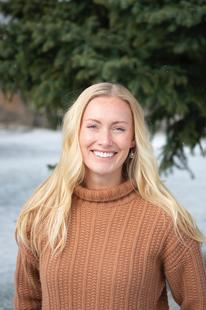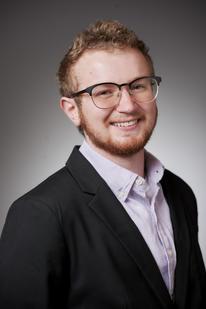The Knauss Fellowship is a national program that places exceptional, early-career graduate students with host offices of the federal government for a one-year fellowship in Washington, D.C. Since 1979, nearly 1,500 fellows have completed the program. Fellows have become leaders in science, policy, and public administration.
“Knauss Fellows have a unique opportunity to directly apply their scientific knowledge and skills to creating smart water and environmental policy for the benefit of the people of the USA,” said MNSG Director John A. Downing. “Multiple serious crises need scientific solutions. Never before has there been more need to engage brilliant young minds to assist our federal agencies and policy-makers to bring sound-science to policy and management for the benefit of us all.”
This year’s class of 86 finalists comprises students and recent graduates from 62 distinct universities, including 16 finalists from nine minority-serving institutions. The finalists represent 29 of the 34 Sea Grant programs. Finalists completed coursework and research in a range of fields, such as biology, chemistry, ecology, engineering, environmental science and management, law, marine and coastal sciences and policy, and several disciplines of oceanography. Of the 86 finalists, 54% are seeking a master's degree, 44% are seeking a Ph.D. and 2% are seeking a J.D.
“With five finalists, Minnesota Sea Grant is excited to support the most finalists in our program’s history,” said MNSG Research and Fellowship Coordinator Alex Frie. “This year, we worked to advertise the fellowship broadly to regional colleges and universities and streamlined the application process to make it easier for students to apply. The Knauss is an exceptional opportunity for graduate students to engage in science policy and planning and to build professional networks at the federal level.” MNSG had one finalist in 2018, 2019, and 2022.
Meet Our Finalists
Brandon Barlow is pursuing a master’s degree in natural resource sciences at the University of Nebraska-Lincoln and is currently working as a graduate research assistant for the Nebraska Cooperative Fish and Wildlife Research Unit, completing a fisheries-related thesis and helping survey recreational anglers. “As a multidisciplinary academic, I recognize the incredible potential of collaborating with people of various professional and cultural backgrounds to solve problems,” said Barlow. “In the future, I hope to find myself in a professional position that provides plenty of opportunities to collaborate with others on a variety of subjects, and I believe the Knauss program has the resources to help me continue my professional journey toward this goal.”
Devin Burri is a graduate student at the Humphrey School for Public Affairs at the University of Minnesota. “My graduate school experience so far has inspired me to pursue locally based climate adaptation research,” wrote Burri who worked as a graduate research assistant conducting a comparative analysis of city- and state-level climate action plans and evaluating resilience goals, adaptation indicators, implementation, and planning practices. "I was drawn to the Knauss Marine Policy Fellowship as it presents a unique opportunity for me to combine my passions of marine science and environmental policy into a dream career to create tangible policy change at a federal level," said Burri. "I am excited about this program not only because of the experience I would get in the executive or legislative branch, but also to find a community of change makers that are excited to change the world with me."
Mary Collins received a master’s degree in global conservation leadership from Colorado State University in Fort Collins, Colorado. Collins is an international program conservation associate for the Center for Large Landscape Conservation in Bozeman, Montana. The Center seeks to protect life on Earth by promoting ecological connectivity to support healthy wildlife habitats and safeguard nature’s resilience to climate change. “As a Knauss Fellow, I will bring the inclusive and open experiences from research, private sector, and nonprofit contexts to government," said Collins. "Whether legislative or executive, the Knauss experience will empower me with insight on how policymakers in the government can best engage scientists, companies, and communities with intention and equity."
Jackie Culotta is a graduate research assistant pursuing a master’s degree in integrated biosciences at the University of Minnesota. Culotta's research is about discovering novel ways to control bighead carp, which are an invasive fish that is a voracious consumer of plankton and can outcompete other native adult and juvenile fishes for this important food resource. "I see the Knauss Fellowship as an opportunity to continue developing my science communication skills, especially on subjects where policy and science intersect in water management," said Culotta. “My longer-term career plan is to continue researching and spreading the word about cost-saving, effective, and evidence-based methods of invasive species control.”
Celina Harris is a graduate student pursuing a doctoral degree in chemistry at the University of Minnesota. Harris’ research is about how rust (iron oxide) interacts with common pollutants in the environment and how those interactions change the pollutants and the rust. “In the real world, systems similar to [my] work are used in engineered underground barriers that help control plumes of pollutants. I am interested in becoming a Knauss [Fellow] because I want to apply my scientific aptitude to making policy impacts that connect with the betterment of our aquatic resources," said Harris. "I have a particular interest in working on policy projects that relate to STEM [Science, Technology, Engineering, and Math] education as it relates to environmental literacy, as well as projects on resource management and sustainability."
The five Minnesota Knauss Fellowship finalists, along with the other 86 finalists from across the country, will be matched with their host office in the fall of 2022 and begin their year-long fellowships in February of 2023.
Placement of 2023 Knauss finalists as fellows is contingent on adequate federal funding in fiscal year 2023.
ADDITIONAL INFORMATION.
Minnesota Sea Grant is one of 34 nationwide federal-university partnerships whose mission is to enhance the practical use and conservation of Great Lakes, coastal, and marine resources in order to create a sustainable economy and environment. MNSG is part of the National Sea Grant College Program, administered by the National Oceanic and Atmospheric Administration.
Recruitment for the 2024 Knauss Fellowship Program begins in the fall of 2022. Applicants must apply through their state Sea Grant program. Contact Minnesota Sea Grant Research and Fellowship Coordinator Alex Frie for Knauss Fellowship information.
CONTACTS.
John A. Downing, director, Minnesota Sea Grant, University of Minnesota and University of Minnesota Duluth, downing@d.umn.edu.
Alex Frie, research and fellowship coordinator, Minnesota Sea Grant, University of Minnesota, and University of Minnesota Duluth, afrie@umn.edu.
Marie Thoms, communications manager, Minnesota Sea Grant, University of Minnesota and University of Minnesota Duluth, methoms@d.umn.edu.
2023 Knauss Policy Fellowship Finalists. Left to right: Brandon Barlow, Devin Burri, Mary Collins, Jackie Culotta, Celina Harris. Image credits: National Sea Grant Office.

